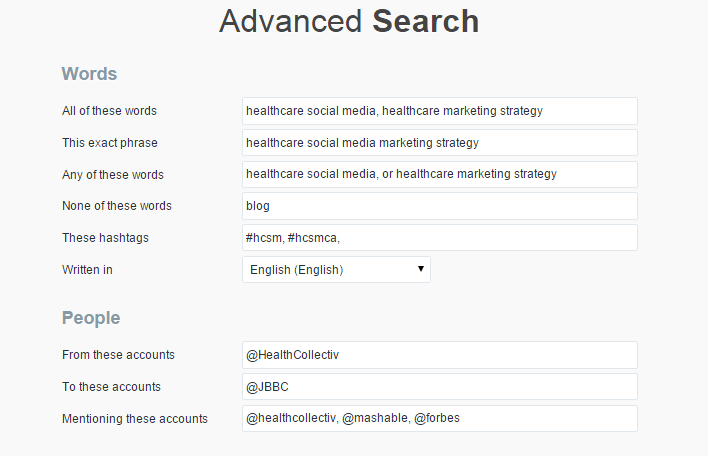Twitter’s statistics are mind-blowing. According to Internet Live Stats, every second, on average, around 6,000 tweets are tweeted on Twitter which corresponds to over 350,000 tweets sent per minute, 500 million tweets per day and around 200 billion tweets per year! So, how do you keep up with all those tweets?
Twitter’s statistics are mind-blowing. According to Internet Live Stats, every second, on average, around 6,000 tweets are tweeted on Twitter which corresponds to over 350,000 tweets sent per minute, 500 million tweets per day and around 200 billion tweets per year! So, how do you keep up with all those tweets? Obviously it’s impossible to keep up, but you can handle the avalanche better through a combination of maintaining Twitter lists of the people you follow, health-related hashtags, etc., and using Twitter’s Advanced Search Engine.
While the easiest way to do a search on Twitter is to click the native search facility, you can do so much more with Twitter’s advanced search capabilities. It allows you to narrow down your search using parameters such as specific keywords, language, people, location, and date range. In today’s article, I will show you twelve ways you can use this powerful search engine to search for health-related content on Twitter.
1. Search for a phrase: for example “healthcare social media marketing strategy”.
2. Search for any of these words: for example “healthcare social media” or “healthcare marketing strategy”.
3. Exclude any word: for example “blog”.
4. Search for health related hashtags: for example #hcsm.
5. Search for any specific language.
6. Choose specific accounts to search within.
7. Or find tweets directed to a specified Twitter user or referencing a specific username.

8. Search for tweets in a specific location or within a specified mile radius of a location. This is particularly useful if you want to connect with patients in your area.
9. Narrow down your tweets within a specific date range. This is useful if you want to catch up on tweets around a specific conference or event.
10. Discover sentiment around tweets – i.e. whether negative or positive.
11. Find health-related questions. This feature enables you to search for conversations happening locally that you might like to add your expertise to.
12. Choose to include re-tweets in your search. I usually exclude this search parameter, as I prefer to concentrare on original tweets; however it may be useful if you want to see how many times a tweet has been re-tweeted or who is re-tweeting specific tweeets.
And here’s a snapshot of my final search results. As you can, I can zoom in on the most popular tweeets, or those who are tweeting in real time. I cans also find photos and videos related to my search. I can even save this search, and embed it on my website.
Considering its capabilities, it is surprising that Twitter’s advanced search engine is so underused. Try using it to create lists, curate content, and as a social media listening tool to find health-related conversations. Once you start, you are sure to find other ways to maximise this powerful search engine to advance your healthcare marketing.